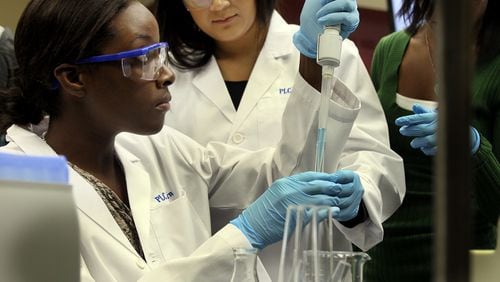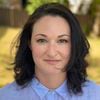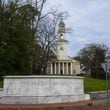Kennesaw State University President Sam Olens and State Rep. Sharon Cooper sparred Monday over whether the school needs to do more to attract women students and faculty to its math and science departments.
The exchange took place during a meeting of the Cobb legislative delegation and local business and elected leaders to discuss the upcoming legislative session.
Cooper dismissed concerns over the dearth of women professors and students in science, technology, engineering and math (STEM) as “political correctness” run amok after Olens said he had observed a gender imbalance on the Marietta campus of KSU, previously Southern Polytechnic State University. The two schools merged in 2015.
Cooper said she hoped Olens was not planning on hiring faculty based on anything other than qualifications, to which Olens replied that the school could maintain standards while increasing the number of women.
“It’s not that you want to lower the standards at all, but you’ve got to create that welcoming environment. And when a female high school student walks on that campus and sees hardly any females, they’re more apt to go to another institution,” Olens said.
“I guess I’m out of touch,” Cooper quipped. “To me, where I went to school, what I wanted was the best, most educated, best qualified” instructors.
The East Cobb representative said one could just as easily object to most Georgia college and university presidents being men (of 29 state schools, just six are headed by women, two of them in interim positions). A lawsuit filed in October argued the selection process that resulted in Olens' appointment was discriminatory because three women faculty who applied did not receive a response from the university. Olens, the former attorney general, was the only candidate interviewed.
Although women have made gains in STEM fields in recent years, particularly life sciences, they still represent a minority in some key areas such as computer science and engineering.
In 2013, women accounted for less than 20 percent of full professors in computer sciences and mathematics and less than 10 percent in engineering, according to the National Center for Science and Engineering Studies. Those numbers were only slightly better for assistant and associate professor positions.
Some experts say the lack of women faculty to act as mentors and role models can discourage women students from pursuing these careers.
In 2014, women received just 18 percent of computer science bachelor’s degrees and 20 percent of engineering bachelor’s degrees, according to the National Science Foundation.
Carol Colatrella, co-director of the Center for the Study of Women, Science and Technology at Georgia Tech, said many top technical schools have launched initiatives to support women students and faculty based on decades of studies and research.
“A lot of it has to do with how comfortable women are doing research, how welcome they feel in the field, if there are people they can talk to, peers and faculty, and we also try very hard to create curricula that are interesting,” Colatrella said.
She said women can internalize negative stereotypes about gender and mathematics, and that it’s important they understand “there’s a future for them” in these fields.
About the Author








